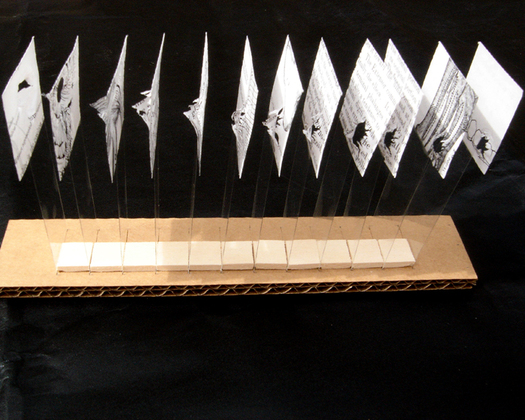
"Bullet Hole Book," via Sydney Schwartz, doctoral thesis flatness.
Dwight Garner’s Riff for The Times Magazine, making the “case for critics who are actually critical” (a subject I’ll leave to others) contains the following passing anecdote:
The novelist Richard Ford, after a dismissive review from Alice Hoffman in The New York Times Book Review in 1986, shot bullets through one of her novels and mailed the mutilated thing to her. “My wife shot it first,” he reportedly said.Now, give Ford (and his wife) some credit here, because this is fantastic. It’s a story I’ve actually heard before, but today I realized I’d really like to see that "mutilated thing." Did Hoffman keep it? She must have, right? What an incredible object!
I’ve had no luck finding an image online, so please post in the comments if you know where one lives.
But meanwhile, let me make the following suggestion for some enterprising curator out there:
Pick a group of 15 to 20 authors. Tell each one to show up at a shooting range or other appropriate venue, bringing along a book by a writer against whom he or she has some sort of grudge — it doesn’t have to be a nasty review, it could be some other professional slight or feud. Then, of course, hand each writer a gun, and let her or him follow the Fords’ example.
The shot books would subsequently be displayed in a gallery, making it clear who squeezed the trigger. I would suggest leaving spouses out of the project, but that’s really up to the curator. I think the curator would also have to decide if the shooter need explain why his or her particular target had been chosen. (Personally, I’d leave it up to the authors, but I have a high tolerance for ambiguity.)
You might think I’m just being clownish here, but I’m quite serious when I say that I think Hoffman’s shot book is an amazing object, even though I’ve never seen it. Crazy as it might sound, shooting the thing was actually, I would argue, an expressive act. (“It's not like I shot her,” Ford once pointed out.) So a collection of shot books might say something about irrationality or the dubious catharsis of violence, sure, but that’s not all. Yammer all you want about the marketplace of ideas; the visceral emotion that a bullet-riddled book captures makes a mighty argument for the power of words to spark a reaction. It articulates the limits of words, too: shooting a book is, although possibly nuts, also a kind of physical essay on the frustrations of the life of the mind. In fact, the exhibition could be called “Words Fail Me.”
And this might not need saying, but something else this show would get at is the fact that writing for a living sometimes entails moments of, let's say, lost perspective. One of the things that I find so captivating about Ford’s act is that I strongly suspect there’s not a published author alive who hasn’t felt some similar urge — Ford just happens to be the only one I’m aware of who actually did it.
So do I know whose book I’d shoot and why? Yes, I do. There’s only one way to get the details, though: Somebody make this happen. Invite me to participate, and I'll pull the trigger.
